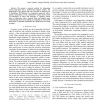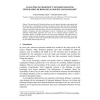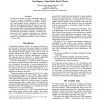218 search results - page 2 / 44 » Learning from Inconsistencies in an Integrated Cognitive Arc... |
ATAL
2003
Springer
13 years 10 months ago
2003
Springer
This paper describes the implementation and evaluation of a framework for modeling emotions in complex, decision-making agents. Sponsored by U.S. Army Research Institute (ARI), th...
TROB
2008
13 years 4 months ago
2008
Affordances encode relationships between actions, objects and effects. They play an important role on basic cognitive capabilities such as prediction and planning. We address the p...
IROS
2009
IEEE
13 years 11 months ago
2009
IEEE
— We present a general method for integrating visual components into a multi-modal cognitive system. The integration is very generic and can work with an arbitrary set of modalit...
APBC
2006
13 years 6 months ago
2006
: The rapid growth of biological databases not only provides biologists with abundant data but also presents a big challenge in relation to the analysis of data. Many data analysis...
AAAI
2008
13 years 7 months ago
2008
Transfer is the ability to employ knowledge acquired in one task to improve performance in another. We study transfer in the context of the ICARUS cognitive architecture, which su...



